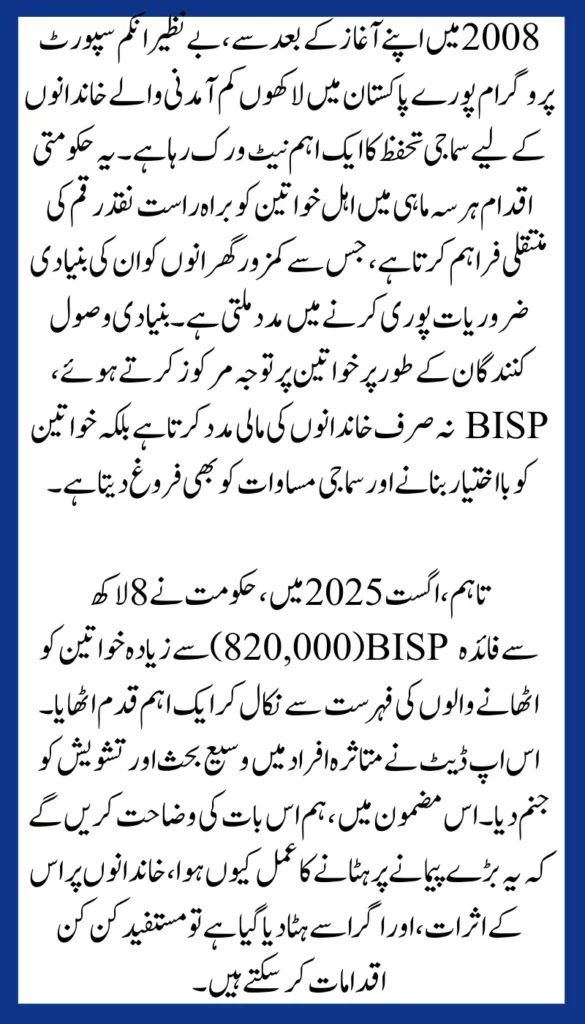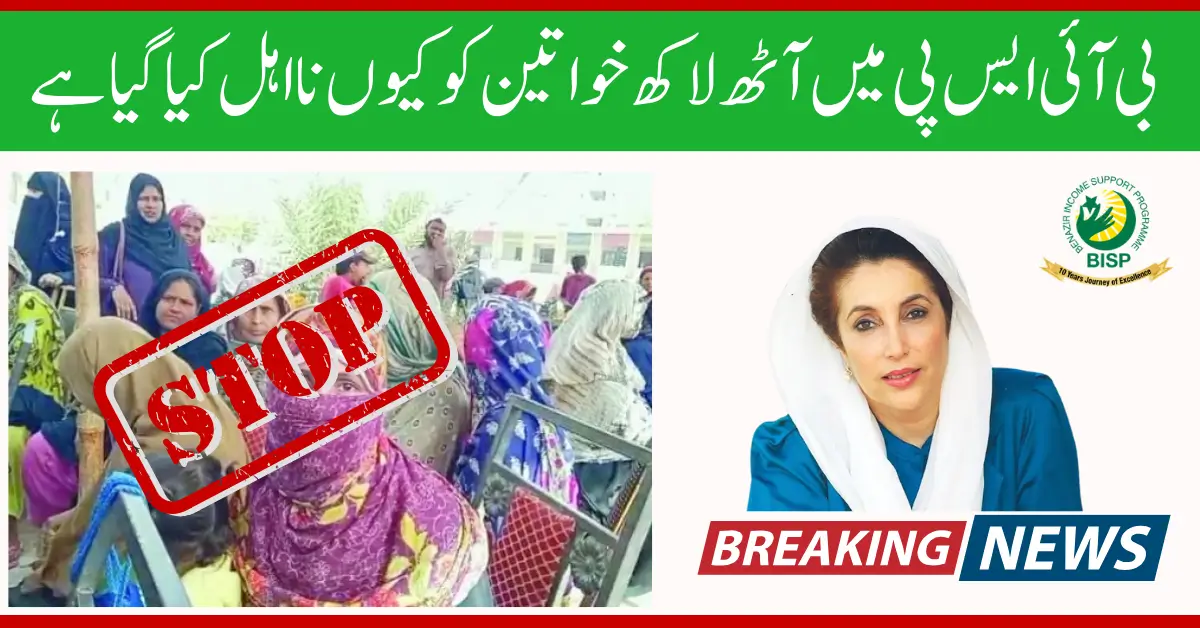Over 0.8 Million Women Excluded from BISP
Over 0.8 Million Women Excluded from BISP: Since its launch in 2008, the Benazir Income Support Programme has been a crucial social safety net for millions of low-income families across Pakistan. This government initiative provides direct cash transfers to qualified women every quarter, helping vulnerable households meet their basic needs. By focusing on women as the primary recipients, BISP not only supports families financially but also promotes women’s empowerment and social equity.
However, in August 2025, the government took a significant step by removing over 8 lakh (820,000) women from the BISP beneficiary list. This update sparked widespread discussion and concern among those affected. In this article, we’ll explain why this large-scale removal happened, its impact on families, and what steps beneficiaries can take if they have been removed.
BISP 8171 Check Online by CNIC 2025 Payment 13500
Why Did the Government Remove Over 8 Lakh Women from BISP in 2025?
The government launched a nationwide verification drive called the Dynamic Survey to ensure that financial aid through BISP reaches only the truly deserving families. This survey collected fresh socio-economic data from beneficiaries and helped identify those who no longer met the eligibility criteria.
The main reasons for the removal include:
- Non-participation in the Dynamic Survey: Beneficiaries who did not participate in the required re-verification were automatically disqualified.
- Improved Economic Status: Families with income or assets exceeding poverty thresholds were removed to focus resources on those most in need.
- Incomplete or Incorrect Documentation: Missing or outdated CNICs, B-Forms for children, or family records led to disqualification.
- High Proxy Means Test (PMT) Scores: The PMT measures poverty levels, and households scoring above the limit were excluded.
- Ownership of Assets: Households owning vehicles, large farmland, expensive properties, or consuming high electricity and telecom bills were disqualified.
- Employment in Government or Pension Recipients: These individuals are not eligible for BISP benefits.
This large-scale update aims to enhance transparency and fairness by removing those who were previously receiving aid despite not qualifying under revised standards.

Punjab Launches School Nutrition Initiative to Boost Children’s Health
What Are the Updated Eligibility Criteria for BISP?
To qualify for BISP, households must meet strict criteria, including:
- Income Limit: Monthly income below PKR 25,000.
- Asset Ownership: No ownership of costly vehicles, large agricultural land (more than 12.5 acres), or expensive real estate.
- Employment Status: No government jobs or pensions.
- Residency: Permanent residents of Pakistan with valid CNICs for adults and B-Forms for children.
- Proxy Means Test: PMT score must be below 32, indicating genuine poverty.
- Documentation: All family details must be accurate and up-to-date.
- Verification Compliance: Beneficiaries must participate in periodic surveys for eligibility confirmation.
These criteria ensure BISP funds support the poorest and most vulnerable families.
Impact of BISP Beneficiary Removal 2025 on Families
The removal of over 8 lakh women from BISP has caused serious financial difficulties for many households. Without regular cash assistance, families are struggling to afford essentials such as food, healthcare, and education. This sudden loss can push already vulnerable households deeper into poverty.
Beyond financial hardship, there are emotional and social effects. Women who lose benefits often face stress and uncertainty while trying to support their families. The stigma of removal can also affect self-esteem and community relationships.
Children’s well-being is at risk too. Reduced income may lead to cutting back on nutrition, healthcare, and schooling, which can have long-lasting consequences on their growth and opportunities.
There is also increased vulnerability to exploitation, such as child labor or early marriages, as families seek alternative ways to cope.
NADRA New update: Importance of a Correct Family Record 2025
What Can Affected Families Do After Removal?
If you or someone you know has been removed from the BISP beneficiary list, here are important steps to follow:
- Verify Your Status:
Check your current beneficiary status via the BISP helpline (0800 26477), official website, or by sending your CNIC number via SMS to 8171. - Complete the Dynamic Survey:
If you missed the required survey or verification process, participate as soon as possible to update your information. - Update Documentation:
Ensure that CNICs and B-Forms for all family members are current and correct. - Appeal or Reapply:
If you believe your removal was a mistake, file an appeal through BISP’s grievance system or reapply when new registration opens. - Seek Support:
Reach out to local welfare offices, NGOs, or community centers for help with the appeal or re-verification process. - Explore Other Aid Programs:
Look for additional government or NGO support programs to assist during the transition.
How to Contact BISP for Assistance
BISP offers several ways to assist beneficiaries:
- Helpline: Call 0800 26477 from anywhere in Pakistan to speak with a representative.
- SMS: Send your 13-digit CNIC number to 8171 for quick eligibility updates.
- Online Complaints: Visit www.bisp.gov.pk to register complaints or submit appeals.
- Tehsil Offices: Visit nearby BISP offices with your CNIC and family documents for in-person assistance.
How You Can Get 8171 Ehsaas Program New Payment Rs. 13,500 With Latest Rules
Conclusion: Striking a Balance Between Transparency and Compassion
The BISP beneficiary removal in 2025 is a significant step towards ensuring that limited resources reach the most deserving families. While this move strengthens transparency and program integrity, it also creates real challenges for many vulnerable households.
Moving forward, the government must provide clear communication, accessible re-verification processes, and compassionate support to affected families. BISP remains a vital lifeline for millions of Pakistani women and their families, and its success depends on balancing accountability with empathy.
By working together, Pakistan can continue to build a fair and effective social safety net that uplifts those who need it the most.
